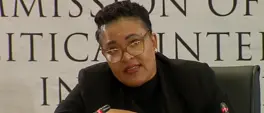How 'Yima' protects love seekers from getting swindled on dating apps
Tasleem Gierdien
13 February 2025 | 5:57The platform uses the Department of Home Affairs' records to cross-check and verify people's identity.
Africa Melane speaks to JustMoney spokesperson Ramokebe Thamage about the financial risks of online dating scams and how to protect yourself.
Listen below:
Scammers prey on those looking for love on dating apps.
The online dating sector is huge, generating over R233 million in revenue in the last year, reports Thamage.
In 2022, South Africans lost over R125 million to online dating scams, with fraudsters using fake identities to manipulate victims into sending money.
Dating scams often happen when scammers catfish love seekers by building fake profiles with fake images and false information about themselves.
Once you match with a scammer, they spend time gaining victims' trust, building emotional connections and manipulating victims by inventing stories that often need immediate attention like medical emergencies or a business crisis which is used to trick victims into sending fraudsters money, explains Thamage.
Most people fall for it because people believe stories when they believe they are in love and emotionally connected to the person they're speaking to, which also makes it easy to overlook red flags, inconsistencies and mismatched information.
There is a way to stay safe on dating apps...
Use services like Yima, a free online platform by the South African Fraud Prevention Service (SAFPS), to help South Africans verify websites, and people's identity and report scams, advises Thamage.
The platform uses the Department of Home Affairs' records to cross-check and verify people's identities.
If the person's biometrics and information on the dating site does not match the information at Home Affairs, the profile can be reported which might help stop scams before they happen, adds Thamage.
If you have fallen victim to fraud on a dating site, efficiency is key, believes Thamage.
"There is somewhat of a hope, as long as you act very quickly as soon as you've identified that you've been targeted, contact your bank, block any transactions, report fraudulent activity and trust your instincts... If you notice something is a bit off and you're sensing dishonesty or manipulation, attend to it."
- Ramokebe Thamage, Spokesperson - JustMoney
Scroll up to the audio player to listen to the interview.
Get the whole picture 💡
Take a look at the topic timeline for all related articles.

















